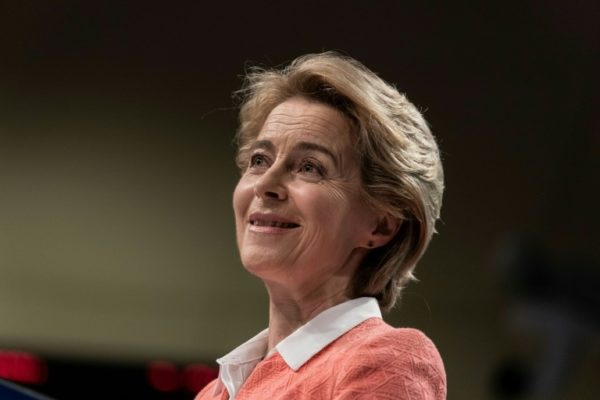Von der Leyen: Brexit not the end of British ties


Published on 10.09.2019 at 13h54 by AFP
Incoming European Commission president Ursula von der Leyen said Tuesday that Brexit — “should it happen” — would be only the start of a new relationship between the UK and the EU, and “not the end”.
In an implicit warning to Brexit supporters in the UK arguing for a so-called “clean break” departure from the European Union with no deal in place, she said the two sides would have to work to build up ties anew after the divorce.
And she gave a boost to Dublin in the Brexit tussle, appointing Ireland’s Phil Hogan as trade commissioner — putting him in charge of negotiating a post-Brexit trade deal with London, a move Irish Prime Minister Leo Varadkar hailed as “a definite advantage”.
“Brexit, should it happen, is not the end of something but it’s the beginning of our future relationship,” von der Leyen said.
The German takes office at the helm of the EU’s executive team on November 1 — the day after Prime Minister Boris Johnson has vowed to get Britain out of the bloc with or without a deal.
Von der Leyen said it was in the interests of both sides to reach an agreement but insisted the EU was fully prepared to cope with the impact if Britain crashes out without one.
The EU’s chief Brexit negotiator Michel Barnier could yet see an extension to his mandate, which was supposed to have ended after the withdrawal agreement was struck with London, von der Leyen acknowledged.
Asked about Johnson being pressured by his parliament to ask for another extension to Brexit — a third, to run until the end of January 2020 — von der Leyen said that was entirely up to London.
“The next steps are completely in the hands and the decision of the United Kingdom. So I will not comment on their decisions and the next steps they might take,” she said.
“So we’ll see how things will proceed.”
– Delayed departure –
Britain was initially meant to have left the European Union on March 29 this year following a 2016 referendum that backed Brexit.
But deep political divisions in Britain over what sort of Brexit it wants — a “soft” one staying close to the vast EU single market or a “hard” one veering clear of its institutions and jurisdiction — have stymied progress, requiring two delays to the Brexit date so far.
Johnson, who became prime minister in July, has sworn he will take his country out of the European bloc “do or die” by the latest deadline, on October 31.
But he has been hamstrung by the UK parliament which has passed a law requiring him to first secure a viable departure deal with the EU.
Even if Britain leaves the EU on time, Brexit will hang heavy over von der Leyen’s new commission, as a new trading arrangement would have to be worked out between the neighbours.
“I think it is very important to have together a very good free trade agreement because I think it will be determining the good relations we want to have in the future,” von der Leyen said.
Even with a divorce accord, there are fears that talks over a comprehensive trade agreement could drag on for years — the EU’s deal with Canada took seven years and the one with Latin America’s Mercosur bloc 20.
Von der Leyen said that until Brexit was finalised it was impossible to speculate about how long such negotiations would last.
Ireland was delighted at the news that Hogan would be at the helm, with Varadkar calling it “a definite advantage to have an Irish person in charge of this crucial brief over the next five years”.
“He has proven to be vociferous on Brexit, and I am sure that this will continue in his new role,” Varadkar said.
Downing Street declined to comment on Hogan’s appointment, saying it was a matter for the EU.










0 Comments